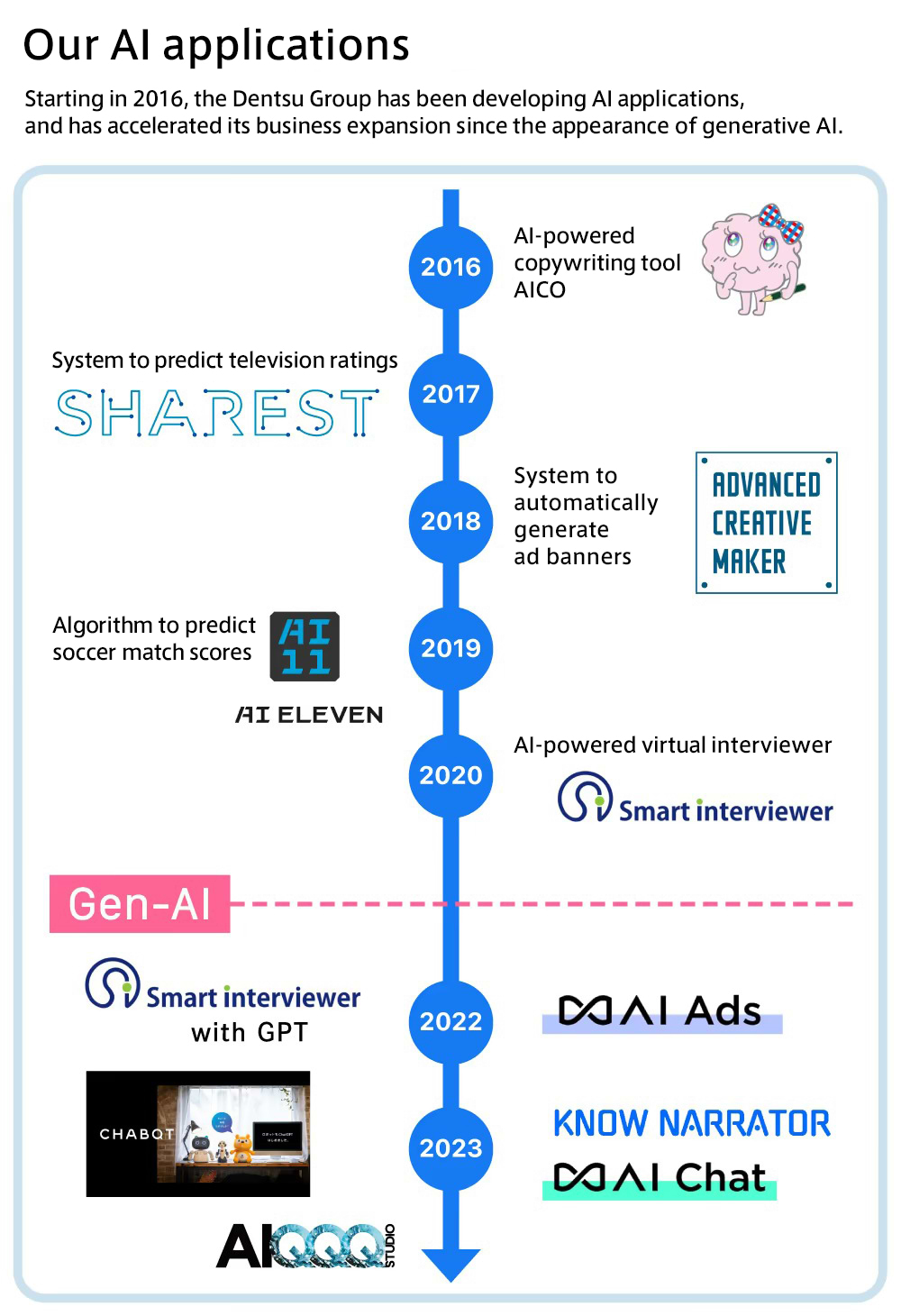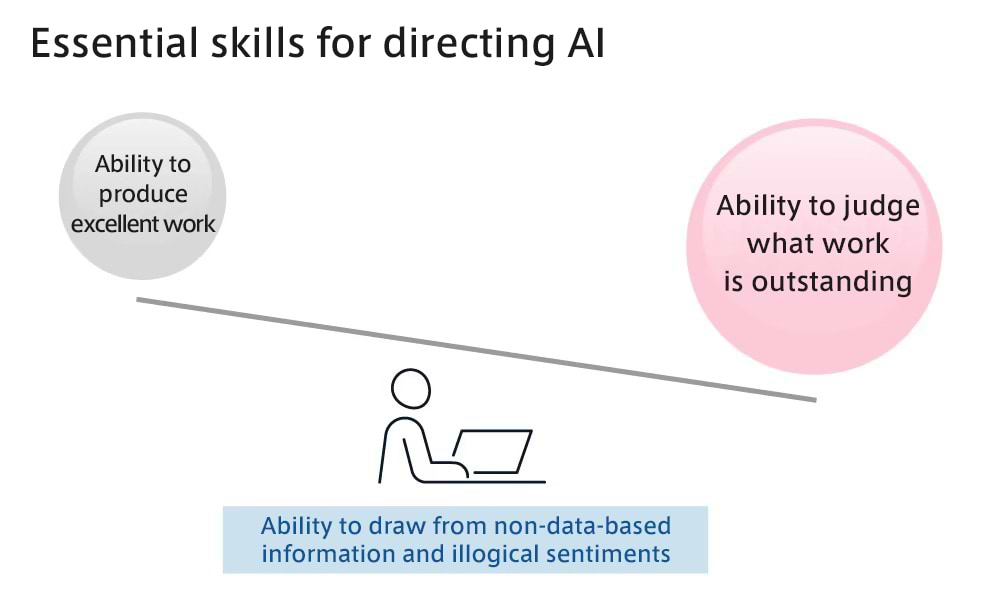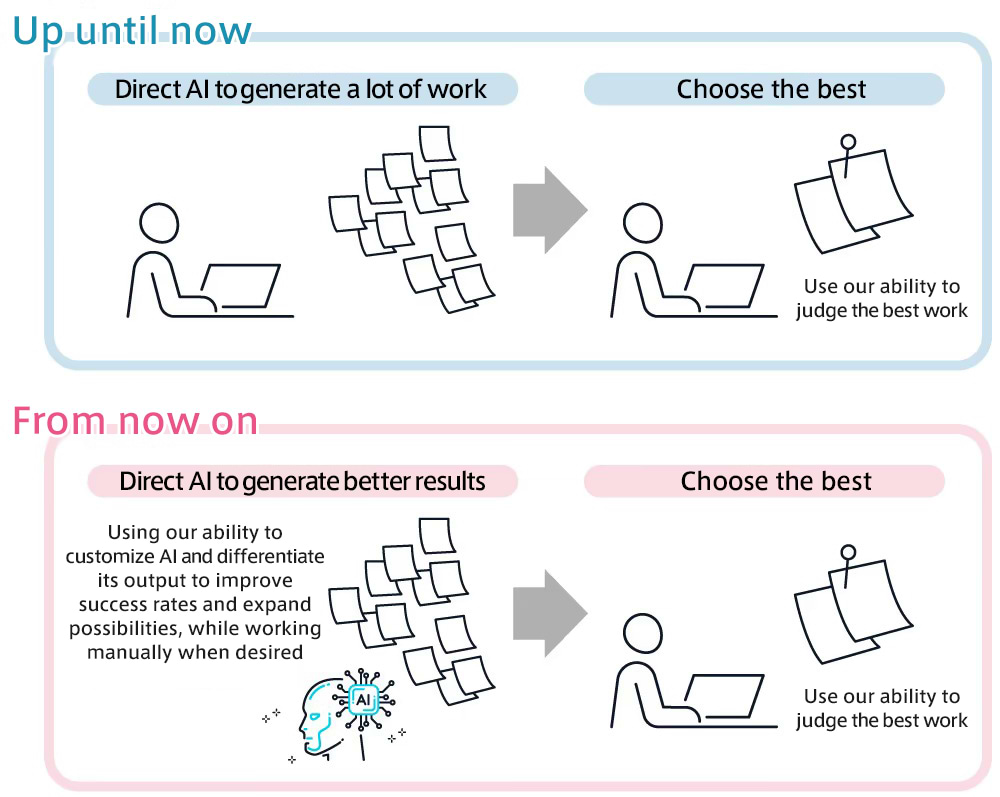To date, our creative technologists have led four workshops under the umbrella title of Dentsu Prototyping Hub. They have dealt with digital creative tools, including the TouchDesigner visual programing language, Blender 3D computer graphics software, and the Unreal Engine computer graphics game engine.
They addressed various topics, from the basics of image generation to challenges involved in practical applications.
Prior to this workshop, Dentsu Prototyping Hub held an event called the Generative AI School. On the opening day, a talk on how Dentsu is approaching generative AI was given by Takuya Kodama, who oversees the Dentsu Group’s AI-related businesses. An abridged version of the presentation is given below.
Ignoring generative AI no longer an option
I began researching and developing AI at Dentsu about seven years ago. I would like to share with you the progress Dentsu has made since then, and how I believe all of us need to make use of generative AI.
Before discussing the Dentsu Group’s generative AI-based tools and services, allow me to begin by looking at how generative AI has impacted our industry since it first appeared. Simply put, the technology has overturned the competitive landscape for players in the marketing industry.
That is not only here in Japan, but around the world. New advertising agencies and consulting companies have been investing in AI technologies and entering the marketing industry. Further, startups with a wide range of technologies, big tech companies, and even corporate clients have begun moving to apply generative AI-driven technologies.
Many of the players have already begun to work seriously on generative AI products and services. For example, Microsoft offers a tool for creating banner ads, and Adobe has developed a variety of creative tools for its Firefly services. A growing number of package design and ad design tools are also becoming available. Indeed, we have seen a sharp rise in the number of companies that use AI-powered tools to produce their own ads instead of using advertising companies.
Some companies consider outsourcing advertising and marketing work as no longer necessary. And here I am not talking about the future; this is happening right now.
Given the circumstances, how advertising companies should deal with generative AI is a critical question. We can no longer turn to easy answers such as, “We should use generative AI to boost our competitiveness,” or “We should create new services with generative AI to boost earnings.” At this stage in the game, companies that do not adapt and evolve in the age of generative AI will not survive.
In other words, simply ignoring generative AI is not an option. I hope you reach this conclusion today.
At the forefront of generative AI
The Dentsu Group has not been a latecomer to the world of AI, already having developed AI applications for quite some time. Back in 2016, for instance, Dentsu released an AI-powered copywriting tool.* Since then, it has repeatedly updated and developed the software.
| * | Please see for details: https://www.dentsu.co.jp/en/showcase/ai_planners.html |

Now I would like to tell you something about the Dentsu Group’s project teams and organizations involved in generative AI, as well as the solutions we are offering.
- Dentsu Inc. and Dentsu Digital Inc. have been conducting joint research with the University of Tokyo’s AI Center, and carrying out a project called Creative Intelligence
- Dentsu Digital employs many people with AI expertise, including individuals who recently won gold medals in an international AI competition
- Dentsu Data Artist Mongol LLC, a development firm specializing in AI, employs many AI engineers
- DENTSU SOKEN Inc.’s AI Transformation Center, an inter-divisional organization within the company, handles everything from AI-based product development to human resources training
- The Septeni Group and Ignition Point Inc. have AI teams and design projects to provide solutions for their clients
- Creative teams from Dentsu Lab Tokyo, Think & Craft, and other Group enterprises are also offering clients solutions that use generative AI and other advanced technologies
In short, the Dentsu Group has numerous teams working on AI. Their members hold weekly meetings to stay abreast of the latest technological innovations in generative AI. They share the relevant information, and conduct hands-on research in new technologies together with Group companies and organizations overseas. One example of the latter is Dentsu Data Artist Mongol in Mongolia.
Further, we collaborate with major online platform providers such as Microsoft, Google, and Amazon Web Services. We provide original solutions and tailor AI applications to meet our clients’ challenges by combining leading-edge technologies of, for example, platform providers with our strength in pinpointing issues and implementing effective responses. Since we have not developed AI chatbot assistants in-house, our employees use the Microsoft Copilot generative AI chatbot in their work environments.
Next, I would like to tell you about some of the solutions and services the Dentsu Group offers.
AI Mugen series
Of the Group’s AI-powered solutions, the best known is Dentsu Digital’s AI Mugen series (mugen means “infinite” in Japanese). I will look at three solutions in the series.
1. Mugen AI Ads
This is a one-stop solution that has been used countless times since its launch at the end of 2022. Mugen AI Ads applies generative AI to create digital advertisements. The AI is used in four ways: to identify appealing points to advertise, automatically generate ad content, predict the effectiveness of the ad, and suggest improvements. The ongoing improvement of creative aspects of the digital ad maximizes its effectiveness.

| Please see for details: https://dentsu-ho.com/articles/8626 |
|
| Note: | The system was called Mugen AI at the time the article was published in June 2023, but the name has since been changed in October 2023 to Mugen AI Ads. |
2. Mugen AI Chat
Mugen AI Chat allows anyone to easily produce a chatbot just by specifying the purpose and level of politeness in Japanese. The chatbot can be integrated with a variety of user interfaces, including product websites and messaging apps such as LINE.

In addition, Mugen AI Chat can converse based on information taken from uploaded files. It can read data in a variety of file formats, including PDF, CSV (for Excel and other spreadsheet software), and PPTX (for PowerPoint and other presentation software).
This means that if a client’s product catalog is uploaded, the chatbot can answer questions about products shown in the catalog.
3. Mugen AI Contents
The function uses AI for generating content to enhance user engagement. One solution it offers is Owned Human, which realizes next-generation owned media by enabling users to converse in real-time with virtual people or characters.
| Note: | A service developed in October 2023 in the Mugen AI series is Mugen AI Chat for Sales, designed for sales staff. Please see for details: https://www.dentsudigital.co.jp/services/AI/mugen-ai |
Dentsu also offers the following AI solution for business development.
AIQQQ Studio
Developed under the direction of Dentsu’s Business Transformation Creative Center, AIQQQ Studio offers consultant-style solutions by combining AI and creative ideas to help develop new business.
For example, the AI can generate a persona for a corporate client to interview it about the importance of new business. Together with AIQQQ Studio, personnel specializing in business design provide assistance with a full commitment to the client.
Dentsu’s AI-based solutions generally take this approach, and the service can devise business models faster than were people or AI to perform the work separately.
Besides the above examples, companies in the Dentsu Group offer many other generative AI-based solutions that clients have used in their advertising and marketing campaigns. Using AI mainly to generate images, we strive to quickly produce creative consumer-focused ads in partnership with our clients.
In addition to advertising, we have created a service that interacts with users in much the same way as would a guide. We used Mugen AI Chat to develop chatbots that help users search for golf courses and driving ranges.
In summing up, essentially my point is that the Dentsu Group has been working hard to provide AI-based solutions and is committed to continuing these endeavors.
News Release
https://www.dentsu.co.jp/news/business/2024/0221-010685.html
Human ability to inspire is important
Now I would like to talk about how we need to change in the age of generative AI.
The use of generative AI by businesses will become increasingly common. Basically, by applying currently available AI services, any company can achieve what others who use AI can do.
However, what in my view is critical, is the need to customize generative AI for each business, so that one can get the most out of it. That means independently developing and managing a dedicated AI assistant or AI agent. Perhaps some of you already are using MyGPT or GPT Builder* in this way.
| * | MyGPT (formerly called ChatGPTs) and GPT Builder are services provided by OpenAI. They allow individual users to customize their own ChatGPT. |
In your creative workflow, you should give precise instructions to your AI assistant, almost as if it were a part of you. Then you should choose the best results from the assistant’s output. Basically, this is creative direction. The time when we will be among millions of creative directors is fast approaching.
What, then, will be essential abilities? Of course, being able to write effective AI prompts and use the latest technologies with a solid grasp of generative AI will be important. But even more so will be the human ability to move and inspire people.
Generative AI can rapidly produce huge amounts of output. It is unbeatable in that respect. Were we, for instance, to ask it to create images of a car driving down a seaside street, two or three hundred images could be generated in an incredibly short time. Yet, the ability to judge which image among the hundreds of options might most excite car lovers is, needless to say, a genuinely human ability.

I believe that illogical sentiments that don’t depend on data, such as intuition, experience, moods, and predictions, will become much more important, specifically for customizing AI and differentiating its output to generate better results. Since by using these results, people will create even better output, we can imagine people and generative AI working together for mutual improvement.

The other day, I had a conversation with Takayuki Fukatsu from a design firm called THE GUILD. Something he said left an impression on me: “The ability to take the initiative will be vital from now on.”
In the past, illustrations, manga, videos, novels, computer programs, and so on could only be created by people with the right skills and talent. Now, however, the hurdles for producing such output are being lowered by the use of generative AI. It can even easily create storyboards for television commercials.
At a time when it is becoming easier to produce creative works, only people who take the initiative will stand out. The shift is accelerating, so it will be essential for people—especially creators—to have a strong desire to produce their work and remain committed to the end.
Until now, it has been cheaper for skilled professionals to immerse themselves in an area of expertise than for people who are really knowledgeable in that area to acquire the professional skills required to produce works in the area. Formerly, all the works were produced by people with skills, whether the works were what they personally aspired to create or what they were paid to create. In other words, skills were valued the most.
Since generative AI has come on the scene, however, professional skills are not required to generate works. Consequently, it is thought better to have people who really love a certain domain choose the best output from the options generated by AI. We may be reaching a time when car lovers produce ads for cars and anime fans create ads for anime products.
People’s love for creative work, which is something AI does not have, will have value in the age of generative AI. From that perspective, people will not become unnecessary, even as generative AI evolves. On the contrary, the ability to move and inspire people, a skill that Dentsu’s creative professionals have been refining for over a century, will become increasingly important. With that in mind, I hope you can imagine how human beings and AI might mutually improve each other.
Using AI to take on creative challenges
Finally, I would like to talk about a basic approach to the risks and ethical issues that come with the use of generative AI.
People often ask about the risks involved in using generative AI. As I have said before, ignoring generative AI is no longer an option. There are risks, of course, and no matter how much we try to mitigate them, they can never be eliminated.
While recognizing the existence of risks, it is essential to address them by putting multiple levels of safeguards in place, before proceeding carefully and cautiously on a case-by-case basis. Dentsu has taken this approach to generative AI in all of its projects.
People have expressed concerns about legal liability for copyright infringement, for instance, but the same risk exists when works are produced by people instead of AI. The rules do not change just because generative AI is used. We should not reject something outright just because of AI and, conversely, we should not feel free to do anything we want with AI.
When using generative AI, we can still work within the bounds of accepted conventions, that is, clearing copyright permissions and complying with laws and software agreements. At the same time, that does not mean we can use AI any way we like just because it’s within legal limits. Obviously, we should never act unethically even if an action is legal; the same holds true when we do not use generative AI.
Before taking on a new challenge with AI, it is essential to verify legal compliance and ethical soundness, hold discussions with clients and business partners in advance, and reach an agreement about the risks involved. Dentsu Japan follows comprehensive guidelines on the use of generative AI, and has set up a specialized consulting service to provide assistance.
As I said earlier, the Dentsu Group is already at the forefront of applying generative AI. We have built up a wealth of experience, put strict safeguards in place, and taken steps to mitigate the risks involved in using generative AI.
It is not a threat for creators. Dentsu has moved and inspired people through creativity, and that will remain essential in the age of generative AI. Let’s continue to draw on our creativity to take on challenges in the years to come.
Related Link
Prioritizing People in an Age of Generative AI (Japanese language only)
